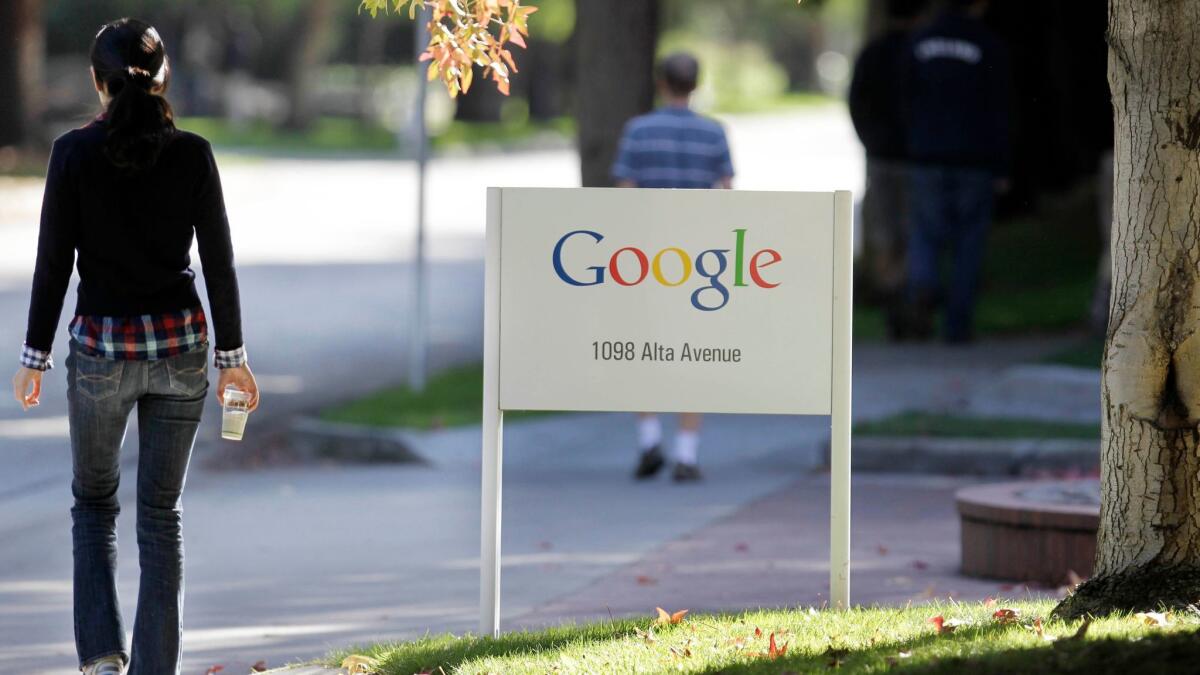Editorial: The EU fires a warning shot at Google and other Internet giants

Alphabet Inc.’s most successful product — the Google search engine — may now be its most problematic. On Tuesday, the European Commission’s top antitrust regulator levied a $2.7-billion fine against Alphabet and Google for the way the search engine handles requests for information about products.
Specifically, Commissioner Margrethe Vestager said that Google skewed its results to bury links to rival companies’ comparison shopping sites while prominently featuring its own service, Google Shopping. Google responded that it’s simply trying to give users what they want and denied “favoring ourselves, or any particular site or seller.” It has a lot at stake: Google has integrated many different offerings into its search engine, including its mapping and travel services. The principle advanced by Vestager, however, is a good one: Giant online companies should not be able to take advantage of their dominance in one field to hurt competitors in another.
It’s a lesson that Microsoft laid out — involuntarily — for the tech companies that would follow in its wake. The software company built a near monopoly in the market for personal computer operating systems, then integrated a series of unrelated products into its Windows operating system, including a Web browser and a digital media player. Those moves helped destroy what had until then been the leading browser maker while draining market share from the pioneering maker of streaming software, bringing down the wrath of the U.S. Department of Justice in the late 1990s.
If Alphabet fails to comply with the commission’s order, it could face a huge additional penalty.
Google’s argument echoes the one Microsoft made: It integrated Google Shopping, which offers links to products at sites that advertise on Google, into its search engine because that gave users quicker access to the information they were seeking. And in the United States, the key question in antitrust law is whether a company’s behavior hurts users, not whether it hurts the company’s competitors.
European regulators focus more on competitors, but they really are two sides of the same coin. If competitors are unfairly closed out, the public can miss out on the very real benefits that vigorous competition provides.
At the same time, it’s undeniable that the public has welcomed virtual monopolies in search, social media and other services in the Internet era. A large part of the appeal of sites like Facebook, Twitter and Snapchat is that so many people use them. There’s a network effect for social media apps in particular — the more people who use the service, the more valuable it becomes to them.
Meanwhile, start-ups come out of nowhere to create whole new categories of must-have apps and products online. That means dominant companies have to innovate too, or else they can easily change from today’s thing to yesterday’s (see: MySpace, Yahoo). And often, that innovation involves finding a better way to do something that a competitor is doing.
The challenge for regulators is to provide the big companies space to try new things without running roughshod over the market, closing out other companies and reducing consumer choice, which will ultimately lead to less innovation. A good place to start is by focusing on cases where there is evidence of intentional undermining of competitors — where a dominant company alters the platform it provides not just to feature its own services, but to make it harder to find or use its rivals’.
European and U.S. regulators also need a common approach to protecting competition and innovation. Otherwise, the risk is that incompatible regulatory schemes will effectively fence off parts of the Internet, requiring companies to offer different products and services in different parts of the world.
If Alphabet fails to comply with the commission’s order, it could face a huge additional penalty: daily fines of up to 5% of its average worldwide revenues. That’s a powerful warning to Internet giants not to innovate in ways that discriminate against their competitors. Regulators need to be careful, though, not to stop them from innovating at all.
Follow the Opinion section on Twitter @latimesopinionand Facebook
More to Read
A cure for the common opinion
Get thought-provoking perspectives with our weekly newsletter.
You may occasionally receive promotional content from the Los Angeles Times.






